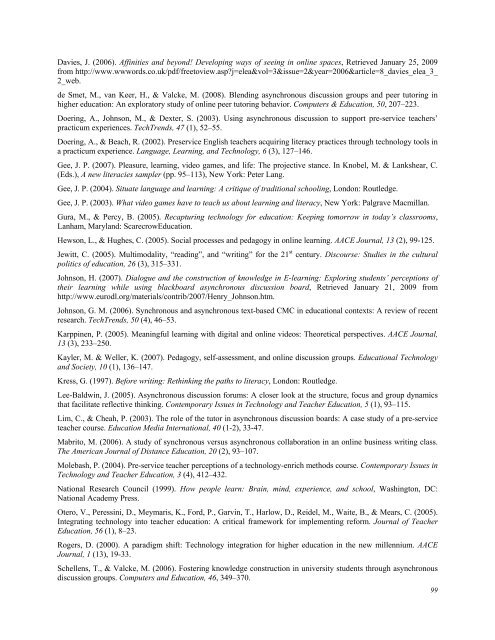Download - Educational Technology & Society
Download - Educational Technology & Society
Download - Educational Technology & Society
You also want an ePaper? Increase the reach of your titles
YUMPU automatically turns print PDFs into web optimized ePapers that Google loves.
Davies, J. (2006). Affinities and beyond! Developing ways of seeing in online spaces, Retrieved January 25, 2009<br />
from http://www.wwwords.co.uk/pdf/freetoview.asp?j=elea&vol=3&issue=2&year=2006&article=8_davies_elea_3_<br />
2_web.<br />
de Smet, M., van Keer, H., & Valcke, M. (2008). Blending asynchronous discussion groups and peer tutoring in<br />
higher education: An exploratory study of online peer tutoring behavior. Computers & Education, 50, 207–223.<br />
Doering, A., Johnson, M., & Dexter, S. (2003). Using asynchronous discussion to support pre-service teachers’<br />
practicum experiences. TechTrends, 47 (1), 52–55.<br />
Doering, A., & Beach, R. (2002). Preservice English teachers acquiring literacy practices through technology tools in<br />
a practicum experience. Language, Learning, and <strong>Technology</strong>, 6 (3), 127–146.<br />
Gee, J. P. (2007). Pleasure, learning, video games, and life: The projective stance. In Knobel, M. & Lankshear, C.<br />
(Eds.), A new literacies sampler (pp. 95–113), New York: Peter Lang.<br />
Gee, J. P. (2004). Situate language and learning: A critique of traditional schooling, London: Routledge.<br />
Gee, J. P. (2003). What video games have to teach us about learning and literacy, New York: Palgrave Macmillan.<br />
Gura, M., & Percy, B. (2005). Recapturing technology for education: Keeping tomorrow in today’s classrooms,<br />
Lanham, Maryland: ScarecrowEducation.<br />
Hewson, L., & Hughes, C. (2005). Social processes and pedagogy in online learning. AACE Journal, 13 (2), 99-125.<br />
Jewitt, C. (2005). Multimodality, “reading”, and “writing” for the 21 st century. Discourse: Studies in the cultural<br />
politics of education, 26 (3), 315–331.<br />
Johnson, H. (2007). Dialogue and the construction of knowledge in E-learning: Exploring students’ perceptions of<br />
their learning while using blackboard asynchronous discussion board, Retrieved January 21, 2009 from<br />
http://www.eurodl.org/materials/contrib/2007/Henry_Johnson.htm.<br />
Johnson, G. M. (2006). Synchronous and asynchronous text-based CMC in educational contexts: A review of recent<br />
research. TechTrends, 50 (4), 46–53.<br />
Karppinen, P. (2005). Meaningful learning with digital and online videos: Theoretical perspectives. AACE Journal,<br />
13 (3), 233–250.<br />
Kayler, M. & Weller, K. (2007). Pedagogy, self-assessment, and online discussion groups. <strong>Educational</strong> <strong>Technology</strong><br />
and <strong>Society</strong>, 10 (1), 136–147.<br />
Kress, G. (1997). Before writing: Rethinking the paths to literacy, London: Routledge.<br />
Lee-Baldwin, J. (2005). Asynchronous discussion forums: A closer look at the structure, focus and group dynamics<br />
that facilitate reflective thinking. Contemporary Issues in <strong>Technology</strong> and Teacher Education, 5 (1), 93–115.<br />
Lim, C., & Cheah, P. (2003). The role of the tutor in asynchronous discussion boards: A case study of a pre-service<br />
teacher course. Education Media International, 40 (1-2), 33-47.<br />
Mabrito, M. (2006). A study of synchronous versus asynchronous collaboration in an online business writing class.<br />
The American Journal of Distance Education, 20 (2), 93–107.<br />
Molebash, P. (2004). Pre-service teacher perceptions of a technology-enrich methods course. Contemporary Issues in<br />
<strong>Technology</strong> and Teacher Education, 3 (4), 412–432.<br />
National Research Council (1999). How people learn: Brain, mind, experience, and school, Washington, DC:<br />
National Academy Press.<br />
Otero, V., Peressini, D., Meymaris, K., Ford, P., Garvin, T., Harlow, D., Reidel, M., Waite, B., & Mears, C. (2005).<br />
Integrating technology into teacher education: A critical framework for implementing reform. Journal of Teacher<br />
Education, 56 (1), 8–23.<br />
Rogers, D. (2000). A paradigm shift: <strong>Technology</strong> integration for higher education in the new millennium. AACE<br />
Journal, 1 (13), 19-33.<br />
Schellens, T., & Valcke, M. (2006). Fostering knowledge construction in university students through asynchronous<br />
discussion groups. Computers and Education, 46, 349–370.<br />
99
















